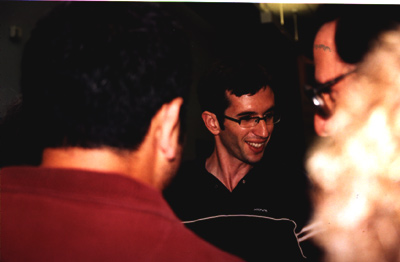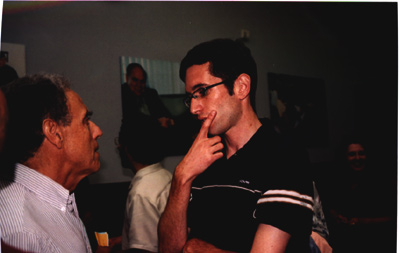Baltimore IMC : http://www.baltimoreimc.org
News :: Middle East
REFUSENIK SPEAKS OUT AGAINST THE OCCUPATION OF PALESTINE
June 5, 2002
Noam Sheizaf, is a member of "Courage to Refuse," the movement of Israeli Reservist Officers who refuse to serve in the occupied territories. About 100 people attended the forum held at Baltimore Hebrew University on June 5 sponsored by "Friends of Peace". Sheizaf challenged the assumptions that the peace movement is having no effect in Israel. He called upon American Jews to oppose the occupation of the West Bank and Gaza Strip.
Noam Sheizaf, is a member of "Courage to Refuse," the movement of Israeli Reservist Officers who refuse to serve in the occupied territories. About 100 people attended the forum held at Baltimore Hebrew University on June 5 sponsored by "Friends of Peace". Sheizaf challenged the assumptions that the peace movement is having no effect in Israel. He called upon American Jews to oppose the occupation of the West Bank and Gaza Strip.

Noam Sheizaf isn't physically what you'd picture as a hardened Israeli Reservist officer. "Today we recognize the 35th anniversary of the Six-Day War, a war that is still being waged," he began his talk. He looks young, he's wiry and of medium height. He talked about leaving the forum early enough to go watch the Lakers game. By profession he is a sports journalist. Yet he is also a Lieutenant in the Israeli Reserves and spent four years in the infantry. He was born and raised in Tel Aviv.
Now he's far from home speaking to crowds of mostly Jewish Americans, in his volunteer role as a spokesman on tour for "Courage to Refuse." As a "refusnik," declaring that he will not serve in the army on the West Bank or Gaza, he has chosen a difficult path. For his refusal, he has spent 28 days in jail, so far. "My time in jail wasn't so bad," he recalled. "I had cable TV and fellow refuseniks in nearby cells." He compared this time in jail to the incarceration of innocent Palestinians during the incursions. He said that Israeli troops rounded up mostly innocent men, for "no reason," had them stripped naked and blindfolded, and many were jailed without food and blankets for several weeks during the cold, rainy season.
>From Loyalist to Refusenik
Noam Sheizaf talked with convincing directness. Having aligned himself with a movement was an act of defiance he arrived at over time. The movement has now grown to 470 soldiers and officers. During the Oslo peace process in
1997, he was stationed in Hebron when Chairman Yassar Arafat of the Palestinian Authority and former Prime Minister of Israel, Benjamin Netanyahu agreed that soldiers would leave Hebron. He recalled his optimism, and as his troops took down the Israeli flag and began to leave the city, he recounted, "I told my men to reflect upon this historical moment."
"A few weeks passed ," he continued. "One day, an Israeli settler disguised as a soldier opened fire upon innocent men, women and children in the Arab market (of Hebron) and injured several people...though no one was killed that day, riots began." Instead of the increased freedom he had anticipated for the Palestinians, the occupation intensified and has continued tightening its stranglehold to the present time.

Lt. Sheizaf told the audience that what continues to be most horrible offense of the occupation are the daily injustices. Armed Israelis harass young and old Palestinians. Arabs are removed from their cars, searched and forced to lie on the ground in front of their families. "I've seen an 18- or 19-year old Israeli soldier with a gun approach a trembling old Palestinian woman." He talked about the endless checkpoints and the 15- minute car trips that consume hours. "It is no wonder they hate us," he declared.
As a commanding officer, his constant witnessing of such oppression began to take its toll. He recounted as time passed, "I no longer saw the Palestinians." When he received orders to take over a Palestinian's home for
security purposes, he just went in, told the family to leave or move to one room, and set up a post on their balcony to guard the street. "I don't know how many houses I entered or how many people I told to leave." In retrospect, he said he realized that this very blindness is the essence of the "colonialist's" viewpoint.
In February 2002, Noam Sheizaf refused to go along with his orders in the occupied territories. He told his commander he would no longer serve there, signed his name to the "Courage to Refuse" petition and faced his family, friends, and his reserve unit. The process of explaining himself, he confessed was "more difficult than jail time."
Sharon and Bush Do Not Take Negotiations Seriously
The lieutenant spoke critically of the Israeli and the U.S. government, neither country having "any sense of urgency" toward peace. Sharon, he declared, "is using every trick in the book not to negotiate." According to Sheizaf, Sharon is encouraging the rapidly encroaching settlements that currently cover 40% of the West Bank. He claimed that Sharon wants the land to be a part of Israel. "You don't build a house if you are just staying for a few days. You don't plant olive trees if you are just visiting. You build
the house because you intend to stay."
He asserted that because the Bush administration placed the blame on the Palestinians, it allows Sharon to keep up his assault on the territories. The "war on terrorism is bad," he said, in the sense that it is fueling the conflict in the Middle East. He challenged American Jews to speak to their government against the occupation.
Faced with a few critical comments, Noam Sheizaf answered calmly. One audience member challenged Noam by saying "you are lucky to be able to express yourself because you live in a democracy." Noam replied that his country was becoming less and less democratic each day. He talked about the growing polarization that leaves no room for a position that is both pro-Israel and against the occupation. Several people in the audience drew a
parallel between the dissent of soldiers and officers in defiance of the Vietnam War and the actions taken by "refusniks" in Israel.
Taking the Risk for Peace
Lt. Sheizaf admitted that his stance is despised by many in Israel, particularly by settlers and politicians. According to him, "refusniks" have been attacked and beaten for their words and acts of opposition. He has been subjected to many accusations, called "coward," "anti-Semite," and "traitor." He believes, however, that the angry rhetoric is a result of the threat the "refusniks" pose to the settlers and the political leaders. An audience member asked if Noam thought that such a small group of dissidents is having an effect. Noam responded affirmatively and speculated that Sharon didn't enter the West Bank during the recent incursions because he was afraid the Israeli soldiers would not fight.
While clearly opposed to the policies of his own government, Sheizaf has no words of praise for Arafat or Hammas. He denounced the horror of the most recent suicide bombing. But he reminded the gathering that "we can only take responsibility for our own acts. We must leave the territories, dismantle the settlements, and then we will see what the Palestinians will do."
Noam Sheizaf told the audience the ideals that the Jewish people brought with their settlement in the desert of the Middle East have been distorted. "We are a humble people who have become Masters of the Holy Land."
The crowd at Baltimore Hebrew University was moved to its feet and applauded as he finished his talk. Many people stepped forward to shake his hand and congratulate him for his courageous stand. A few people disagreed. One woman quietly expressed her opinion, "I don't agree with him. I think he's wrong."
Later in an interview, Noam Seizhaf expressed his concern that he is not being heard by the people who need to hear him most, referring to the "Jewish mainstream." He asserted that American Jews' identities are so "intertwined
with the fate of Israel" that they are unable to confront the wrong that is being done. Though Israel is well armed with American tanks, guns, and missiles, the out-powered Palestinians continue to fight for their freedom and their land, and, "we blame them for fighting for what is theirs."
When asked if women were refusing to serve, he said, "No." He explained that women are not conscripted into combat, but must volunteer. Those who do so tend to want to "prove that they can do anything a man can do."
Asked if his family supported his actions, replied, "Though at first they opposed my decision of dissidence, they fully support me now."
For more information about the "refusenik" movement, see
www.seruv.org.il.
Views
Information
Search
This site made manifest by dadaIMC software
